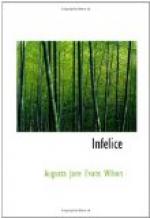“Certainly, dear; keep it as long as you choose. But I am afraid none of us will sleep much to-night. It is a heavy trial to give up Douglass. He is my younger, better self.”
He walked slowly away, and she thought he looked more aged and infirm than she had ever seen him, his usually erect head drooping, as if bowed by deep sorrow.
For an hour after his departure his footsteps resounded in the room overhead, as he paced to and fro, but when the distant indistinct echo of the town clock told two all grew quiet upstairs.
In the dining-room the shaded lamp burned dimly, and Regina could see the outline of Hannah’s form on the sofa, and knew from the continual turning first on one side, then on the other, that the old woman was awake, though no sound escaped her.
Engrossed by a profound yet silent grief that rendered sleep impossible, Regina lay with her hands folded over the small packet, wondering what it contained, regretting that the conditions of the gift prohibited her opening it for so many long years, and striving to divest herself of a haunting foreboding that she had looked for the last time on the bright benignant countenance of the donor, who was indissolubly linked with the happiest memories of her lonely life.
Imagination magnified the perils of the tedious voyage that included two oceans, and as if to intensify and blacken the horrors of the future all the fiendish tragedies of Delhi, Meerut, and Cawnpore were vividly revived among the missionaries to whom Mr. Lindsay was hastening. Deeply interested in the condition of a people whose welfare was so dear to his heart, she had eagerly read all the mission reports, and thus imbibed a keen aversion to the Sepoys, who had become synonymous with treachery and ingenious atrocity.
Is there an inherent affinity between brooding shadows of heart and soul, and that veil of physical darkness that wraps the world during the silent reign of night? Why do sad thoughts like corporeal suffering and disease grow more intense, more tormenting, with the approach of evening’s gloom? Who has not realized that trials, sorrows, bereavements which in daylight we partly conquer and put aside, rally and triumph, overwhelming us by the aid of night? Why are the sick always encouraged, and the grief-laden rendered more cheerful by the coming of dawn? Is there some physical or chemical foundation for Figuier’s wild dream of reviving sun-worship, by referring all life to the vivifying rays of the King Star? Does the mind emit gloomy sombre thoughts at night, as plants exhale carbonic acid? What subtle connection exists between a cheerful spirit, and the amount of oxygen we inhale in golden daylight? Is hope, radiant warm sunny hope, only one of those “beings woven of air by light,” whereof Moleschott wrote?




